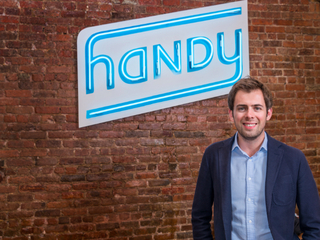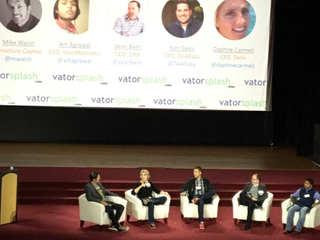Video: Jeffrey Brewer at Vator Splash Health 2017
Building out the artificial pancreas to treat diabetes
Read more... One of the most well-received sessions at Vator Splash Spring was delivered by Brett Wilson, co-founder and CEO of TubeMogul.
One of the most well-received sessions at Vator Splash Spring was delivered by Brett Wilson, co-founder and CEO of TubeMogul.
Today, Wilson's company offers a software platform for brands to plan, buy, measure, and optimize their global cross-screen advertising spend. Wilson shared that TubeMogul managed $424 million in ad spend last year, and projects that figure to grow to $578 million in 2016.
TubeMogul went public in July 2014 (NASDAQ:TUBE) and is now trading at $12.19—up six percent since its debut but down 10.4 percent for the year. The company's market cap now sits at about $436.6 million.
Like many other tech companies from the Bay Area, however, TubeMogul started with humble beginnings. Wilson said the story began at the Haas School of Business (UC Berkeley), where he and his future fellow co-founders won a business plan competition in 2007. That win netted them $22,500 in startup capital.
"Our spouses in the audience didn't think there was a snowball's chance we would win this thing," admitted Wilson. "And if they knew winning would mean we'd be working for free for years, they probably wouldn't have wanted us to."
Yet their hard work in those early years obviously paid off. Here were the three lessons learned Wilson shared from his time growing TubeMogul:
1. Culture is everything
When Wilson and his colleagues started the company, he said, "We didn't have that much going for us."
Their office was in the basement of a hotel, none of them had every started a software company, none of them had ad experience, and none of them had ever raised money. What they did have, however, was a set of shared values that they prioritized above everything else.
Later in the presentation, Wilson shared how maintaining a "high say-to-do ratio" was crucial to the company's culture. In its early days, TubeMogul gave everyone sales goals, including engineers and the CTO.
As one specific instance of the company's hardcore dedication to execution, Wilson said they were about to miss a major product launch important to a customer, so the team locked themselves into a DoubleTree hotel 24/7 until the product was finished. To memorialize the time and the dedication of those employees, TubeMogul now has a conference room called "DoubleTree."
"Be as dogmatic about culture as about the products you want to build," said Wilson.
2. Challenge the status quo
By 2011, digital advertising was already an enormous business. Spend had increased to $84.8 billion for the year, accounting for more than 17 percent of all media spend, according to GroupM.
So it's safe to say that many players in the ad business were quite happy with the status quo.
Less clear was the fact that many kinks had yet to be sorted out. While a brand spending X amount on TV or radio likely had a good sense of what they were getting, the results were a bit more obscure for brands spending that same X amount on digital advertising.
In 2011, TubeMogul decided to shine a spotlight on that fact by calling attention to "fake pre-roll" ads, which the company claimed ad networks used to fulfill campaigns misleadingly. While a brand might be told these were video ads users were intentionally watching before their content, many actually turned out to be auto-playing in a sidebar or banner that the user had no intention of seeing.
TubeMogul's way of raising awareness—launching a site called fakepreroll.com which contained these fake ads—ultimately earned the company "multiple frantic calls and emails and two cease and desist letters."
But the company made its point and got some attention. Wilson's point? You have to be willing to challenge the status quo if you want to succeed in a big way.
3. Focus on big and addressable market
This is one that many entrepreneurs intuitively understand, and will hear time and time again.
In the case of TubeMogul, it's hardly worth mentioning. As stated above, digital ad spend in 2011 had already increased to $84.8 billion.
Last year, digital ad spend grew 17.2 percent to nearly $160 billion, according to the Interpublic Group's Magna Global. The firm forecasts that digital will surpass TV in ad spend by the end of 2017. There's nothing quite as big and addressable as the advertising market.
But Wilson's point stands: for any entrepreneurs that want to make a big, powerful impact with their startups, they need to start with an idea that has the potential to make that impact.
Thanks to our amazing top-tier Splash Spring 2016 sponsors: KPMG, Javelin Venture Partners, SAP Startup Focus Program, Bread and Butter, Kapor Center for Social Impact, Lyft, Avison Young, Tubemogul, Wendel Rosen and Dictionary.com.
Building out the artificial pancreas to treat diabetes
Read more...The future of care; what will work and what won't?
Read more...The Future of Health & Medicine: Where Can Technology Take Us?
Read more...Startup/Business
Joined Vator on
Founded in 2006 by online video buffs who met while in graduate school and won the UC Berkeley Business Plan Competition, TubeMogul's objective from the start has been to empower online video producers, advertisers and the online video industry by providing publishing tools and insightful, easy to interpret analytics.
With TubeMogul, users upload videos once and TubeMogul deploys them to as many of the top video sharing sites the producer chooses. TubeMogul's integrated analytics then provide a single source of metrics on where, when, and how often the videos are viewed. TubeMogul's free beta service has been live since November of 2006. In January 2008, TubeMogul announced the launch of its Premium Products, which include a host of new professional features.

Joined Vator on


